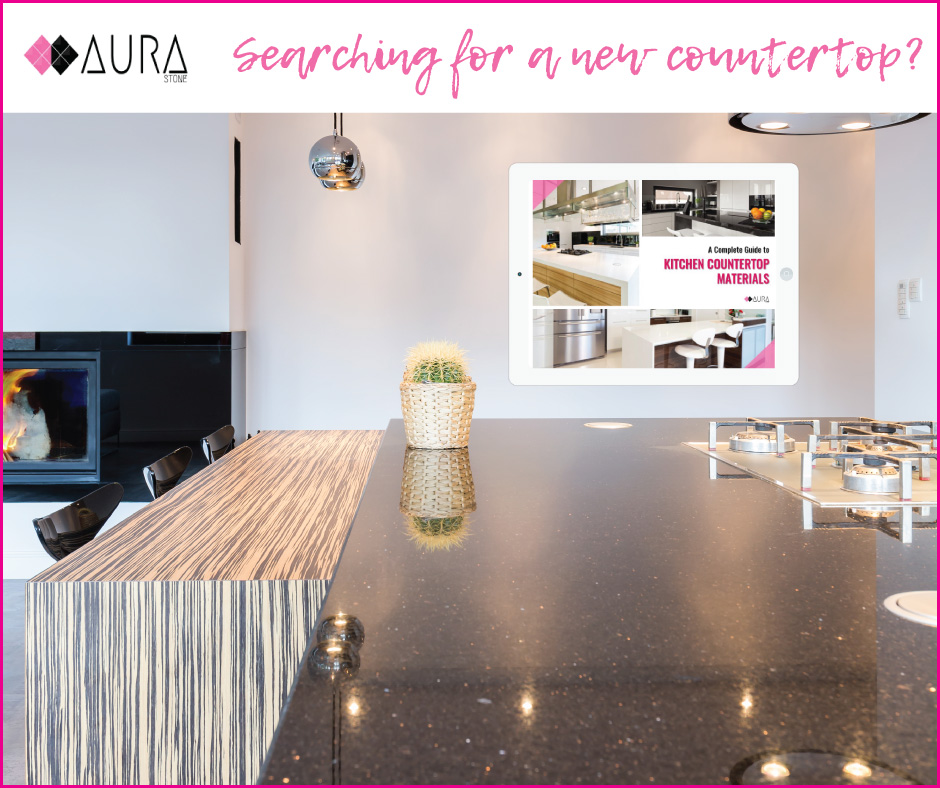Whether it is a replacement or a brand-new kitchen countertop, premium engineered countertops have gained a solid fan base in the world of modern kitchens. On the surface (pun intended), there are many types of countertops. However, quartz and solid surface reign as two of the best premium engineered countertop materials available in the market.
They are measured in terms of aesthetics, durability and long-term cost-effectiveness. But one fundamental question stands out: Solid surface vs quartz countertops – which works best for you?
Read on below, as we weigh the qualities of both materials to ensure you get the right fit for your kitchen.
Solid Surface Countertop
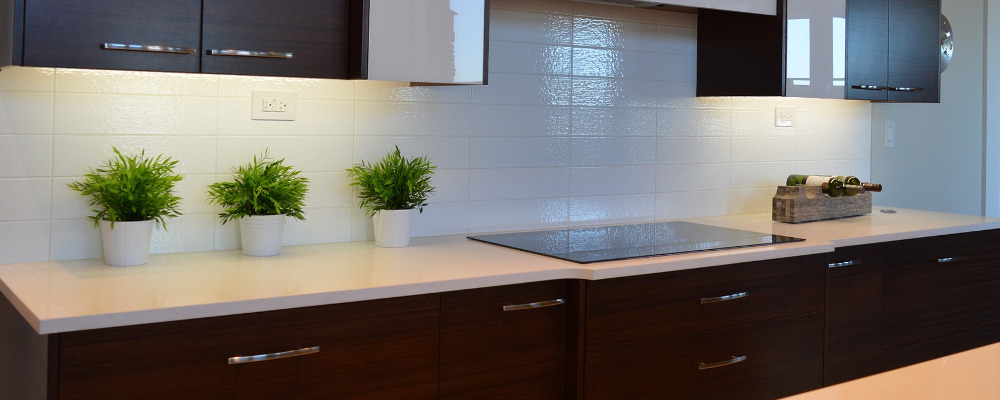
A solid surface countertop is either moulded acrylic, polyester-based, or a combination of the two. The result is a stone-like material which is uniform, modern and minimalist.
Durability
The solid surface countertop often has a natural finish but lacks the toughness of stone. If you’re not careful, it is susceptible to chipping and scratches. Though your countertop may still in intact, these marks will look unsightly and stand out like a sore thumb.
Use a board when you’re cutting food. And do not take the shortcut of defrosting your bag of frozen food by slugging it onto the countertop. If one area takes too much damage, the entire countertop will need to be replaced.
Heat Resistance
Although it can hold up to 100 degree Celsius of water boiling point, anything hotter than that may cause the countertop to warp and deform.
You will need to be extremely careful when placing hot pans and boiling kettles directly onto solid surface kitchen countertops. The heat will damage the countertop leaving a hideous mark on it.
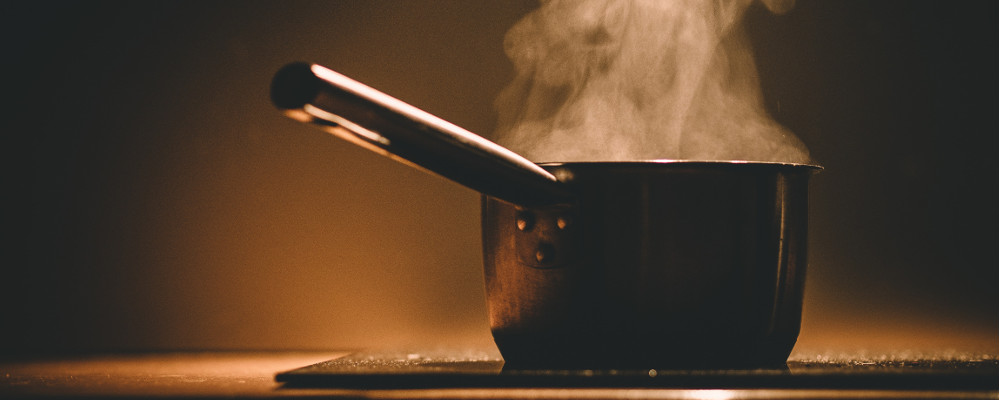
Aesthetics
Solid surface countertops come in a myriad of colours. The hues are created by mixing the coloured pigments and resin during the manufacturing process. As such, you’re spoiled by a wide selection of colours to match your kitchen décor.
The beauty of solid surface lies in its seamless design that can fit most shapes and be custom-made to your specification.
The material can be moulded into curves using the thermoforming process. The process creates a single seamless product that allows for unique features such as moulded sinks and integrated backsplashes.
Maintenance
Unlike natural stone, the solid surface needs no sealants because it is non-porous. Hence, you don’t need to worry about staining or built-up bacteria. A simple disinfectant wipe will keep your countertops squeaky clean and hygienic.
Do note that solid surface countertops tend to lose their sheen over time. It requires regular polishing to bring back its original shine. However, you need to be aware that after 3 times of re-polishing, your solid surface countertop will reduce in thickness.
Of course, this should be done by the experts to prevent damage to your polished surface. Be prepared for a major clean up because particles will fly everywhere.
Harsh chemicals may damage the surface. Be careful when you’re handling nail polish, thinners, oven cleaners, paint removers and other strong chemicals.
Hygiene
Generally, the solid surface is a hygienic material for food preparation. Due to its non-porous nature, it is relatively high in stain resistance.
However, the circumstances may differ once the surface is chipped or scratched. A defaced solid surface countertop makes cleaning harder. Chips and scratches on the surface may trap dirt and moisture in between which allows for bacteria to grow.
Should your solid surface suffer light scratches, it is possible to restore it by sanding and polishing the surface.
Cost
Solid surface countertops cost less than natural and manufactured stone. It is considered the entry-level for premium countertops compared to quartz, granite, and marble. This makes it a viable option if you are on a budget.
While it is relatively cheaper, bear in mind that the installation cost may be costly.
Quartz Countertops
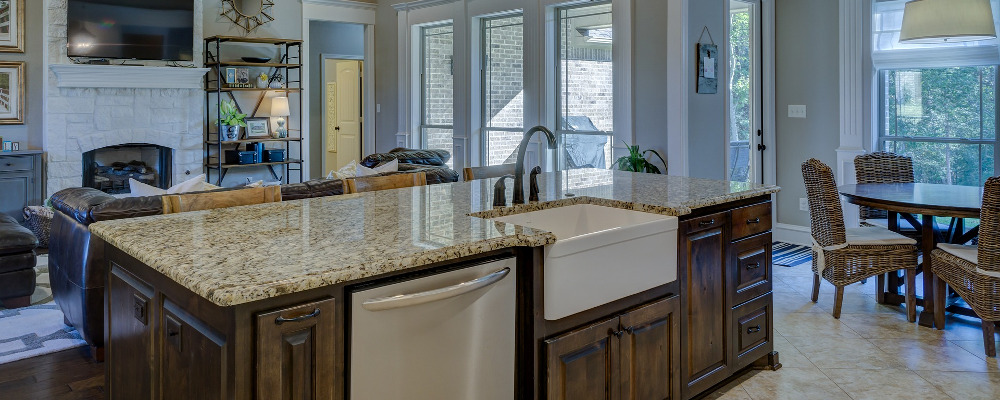
Quartz is a premium material, made from 85-95% crushed quartz and a resin binder. There are various brands in the market for premium quartz countertops such as Silestone, Caesarstone, and Aurastone.
Durability
Quartz countertops are tougher than natural stone. With its durability and natural appearance, quartz is often compared to granite.
Unlike solid surface, you don’t need to worry about chipping your quartz countertops. They are durable and scratch-resistant, coming in second to the diamond, sapphire, and topaz! That is almost indestructible!
Heat Resistance
Quartz has a much higher heat resistance when compared to a solid surface. It can take heat up to 204 degree Celsius.
This makes it well suited to be used near ovens without danger of warping and deforming. Nonetheless, here’s a word of advice: Use heating pads to prolong the lifespan of your countertops.
Aesthetics
If you love the look of natural stone minus the maintenance that comes with it, quartz is the perfect alternative. Quartz is getting more popular with kitchen designers because of its polished finish, colour options, and ability to mimic the look of natural stones.
The colour of a quartz countertop comes from the resin used to bind it together. As a homeowner, you can customise the countertop to suit your preference. With better flexibility for the design and style, the selection process becomes easier.
You can achieve uniformity in design throughout your home with quartz from the countertops to the backsplash.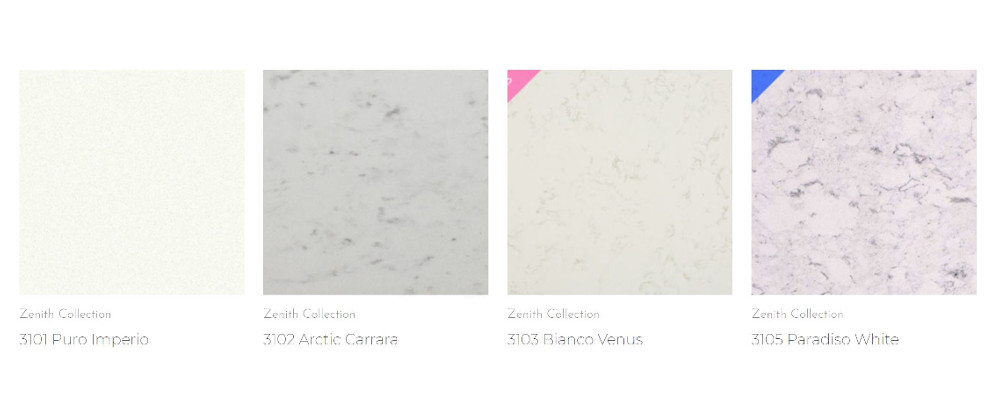
However, unlike solid surface, quartz is not seamless. If you are after a complex design, take care to ensure that there aren’t too many visible seams.
Hygiene
Quartz surfaces are non-porous. The material is engineered by compacting crushed quartz bits and resin until it leaves no gaps in between.
Without the pores that trap water, coloured pigments and microbes, it eliminates the conducive environment for germs to breed. That is why most quartz countertops are NSF certified to give you the assurance that is safe for food preparation. NSF is a third-party accreditation body that ensures products you use meet stringent standards for public health protection.
With the recent on-going pandemic, people are beginning to be more health and hygiene conscious. It is only natural that quartz becomes the favoured material for kitchen countertops.
Maintenance
Due to its non-porous nature, the quartz countertop doesn’t require any sealing. A simple wipe clean is enough to keep germs off your kitchen surfaces.
With hassle-free maintenance and ease of cleaning, the quartz countertop is a preferred choice among busy professionals and families with young active kids. You can allocate your time for more meaningful activities rather than cleaning stubborn stains in the kitchen.
Cost
Because of its premium qualities, quartz is relatively more expensive than solid surface countertops. However, with its durability and long-lasting benefits, it is worth every dollar you spend.
Solid Surface vs Quartz Countertops – What’s Your Choice?
Both materials create durable, sanitary and easy-to-clean countertops. With colours to match every style available for both, we have to look at the unique benefits to decide which is perfect for you.
If you need a seamless finish, or your budget won’t stretch to quartz, then a solid surface countertop is your best choice. Otherwise, the superior toughness and heat resistance of the more premium quartz outshines the other.
Ultimately, your lifestyle dictates your choice of material in the debate of solid surface vs quartz countertops.
A premium product like quartz needs real experts to get the most out of your installation. At Aurastone, we have the expertise needed to guide you through your decision-making.
Contact us to find out how we can make your kitchen dreams come true.

